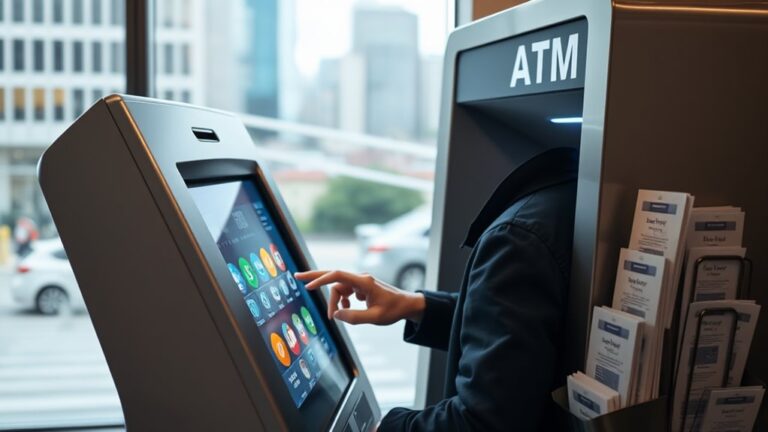
Sell Crypto for Cash: Essential Methods to Convert Quickly
To sell cryptocurrency for cash quickly, individuals can utilize centralized exchanges that offer efficient trade execution and security, peer-to-peer (P2P) platforms that enable direct exchanges among users, or Bitcoin ATMs for immediate cash transactions. Each method comes with varying levels of fees and security measures. Exploring these options helps in understanding which method aligns best with one's needs, ensuring a smoother, quicker sale process. Further exploration can provide deeper insights into optimizing these transactions.
Key Takeaways
- Utilize Bitcoin ATMs for immediate cash transactions, despite higher fees.
- Access centralized exchanges for reliable, swift trading and cash withdrawal features.
- Employ P2P platforms for negotiating direct trades with flexible payment options.
- Use brokerage accounts to sell crypto futures or ETFs quickly through traditional financial systems.
- Consider crypto debit cards for converting and spending crypto as cash easily.
Exploring Centralized Exchanges for Quick Crypto Conversions

Why are centralized exchanges a go-to option for those looking to convert cryptocurrency into cash swiftly?
Centralized exchanges offer a robust, intermediary-based platform for managing transactions between buyers and sellers, ensuring high liquidity and rapid trade execution. These exchanges integrate advanced trading features like futures and margin trading, tailored to both novice and expert traders.
Centralized exchanges ensure swift transactions with high liquidity and advanced trading features.
For security, they implement stringent compliance with Know Your Customer (KYC) and Anti-Money Laundering (AML) guidelines, alongside rigorous user authentication processes and cold storage solutions for asset protection.
Users appreciate the ease of converting crypto to fiat currencies, bolstered by user-friendly interfaces and dedicated support.
However, the necessity to trust the platform with personal funds remains a critical consideration.
In addition to the advanced trading features, most centralized exchanges support a variety of trading pairs which allow users to trade different cryptocurrencies against one another or against fiat currencies, enhancing flexibility and accessibility.
How P2P Platforms Facilitate Direct Crypto Transactions

Peer-to-peer (P2P) platforms revolutionize the way individuals directly exchange cryptocurrencies by removing the reliance on centralized financial institutions. These platforms serve as decentralized marketplaces where users can post offers to trade various cryptocurrencies, enabling autonomous control over financial transactions. Through the use of escrow services, cryptocurrencies are securely held until both parties confirm the transaction, reducing fraud risks. Additionally, robust KYC verification processes and reputation systems assess the reliability of trading partners. This setup enhances security and fosters a more customized trading environment. Users benefit from a wide range of payment options and the ability to negotiate transaction terms directly, supporting financial inclusion by facilitating access to digital currencies even for those without traditional bank accounts. Key features such as transaction security, personalized trading conditions, and diverse payment methods underscore the appeal of P2P platforms for novice and experienced traders alike.
The Convenience and Costs of Using Bitcoin ATMs

Bitcoin ATMs offer a fast solution for converting cryptocurrency to cash, attracting users who value speed and convenience.
However, these machines typically impose higher transaction fees compared to online platforms, a factor that users must consider when choosing this method.
Additionally, the fees charged can vary greatly between different ATM locations and operators, adding an element of unpredictability to the costs.
ATM Transaction Speed
Several Bitcoin ATMs offer the advantage of instant transactions, transforming the way users interact with digital currency. Particularly, cash-to-crypto transactions are completed swiftly, providing immediate access to digital assets.
For certain cryptocurrencies like TRX and DASH, these machines can process transactions within a mere 1-2 minutes. However, the speed is appreciably influenced by the type of cryptocurrency and the specific blockchain network employed.
Bitcoin transactions at ATMs typically achieve at least one confirmation within one hour but may face delays during periods of high network congestion.
These elements highlight the efficiency of Bitcoin ATMs in facilitating rapid transactions, considerably benefiting users requiring quick access to or disposal of their cryptocurrencies.
For those new to the crypto world, understanding fee structures is crucial when choosing an ATM or exchange platform.
Fee Considerations
Facing the convenience of immediate cryptocurrency transactions, users must also consider the substantial fees associated with using Bitcoin ATMs.
These fees can range drastically—from as low as 4% to a high of 30%. These are composed of transaction fees, set by operators to cover operational costs such as maintenance and compliance, and network fees, which fluctuate with blockchain congestion and are passed to users without markup.
While Bitcoin ATMs offer the benefit of fast and straightforward transactions, the financial cost can be significant compared to other methods like centralized exchanges, which often have lower fees but may require more time for transactions to process, demanding a balance between convenience and cost for users.
In seeking alternatives, users might explore decentralized exchanges for potentially lower transaction costs and enhanced control over their funds.
Leveraging Crypto Debit Cards for Everyday Purchases

When considering crypto debit cards for everyday purchases, selecting the right card is essential to aligning with personal spending habits and financial goals.
Important factors include understanding and managing the daily and monthly spending limits that are typical with these financial tools.
These cards integrate digital currency into regular commerce, providing a functional bridge between crypto assets and conventional marketplaces.
Selecting Suitable Cards
Choosing the right crypto debit card for daily spending involves understanding various card features and how they align with individual financial habits. Not only should the card support numerous cryptocurrencies, but it should also come with benefits like cashback in digital currencies and be compatible with major payment systems such as Apple Pay and Google Pay. Security is vital; robust measures like two-factor authentication must be in place to protect transactions.
For those new to digital currencies, considering a hardware wallet can provide an added layer of security beyond what most debit cards offer.
| Feature | Importance | Considerations |
|---|---|---|
| Cashback Programs | Offers financial bonus | Check rates & eligibility criteria |
| Global Acceptance | Use anywhere | Guarantee coverage by major networks |
| Security Measures | Safeguard assets | Mandatory features like 2FA |
Confirming these elements are met will enhance both usability and security.
Managing Spending Limits
Understanding how to manage spending limits is essential for anyone using crypto debit cards for daily purchases. These cards typically have a monthly cap ranging from $5,000 to $30,000, with daily spending limits set at roughly $2,500, though these can vary based on verification status. ATM withdrawal limits generally range from $500 to $1,000 per day. It's crucial to recognize that issuers might increase these limits based on demonstrated responsible usage. Transaction fees, foreign transaction fees, and potential annual fees also affect overall spending. Each issuer's risk assessment policies can greatly influence spending abilities, emphasizing the need for consumers to fully understand their specific card's regulations and limitations to optimize their financial transactions. Additionally, employing strong passwords and two-factor authentication can further protect your financial transactions from unauthorized access and enhance the overall security of your digital assets.
Utilizing Brokerage Accounts to Trade Crypto Like Stocks

Although traditional brokerage accounts initially did not support direct cryptocurrency trades, they now offer various crypto-related investment options like Bitcoin futures and ETFs. Platforms such as Robinhood and Interactive Brokers have adapted by providing user-friendly interfaces for trading these assets. Most brokerages restrict offerings to a handful of major cryptocurrencies or associated financial products, like Ethereum and Bitcoin futures. Trading through these accounts introduces benefits like integration with other financial instruments and higher security standards. However, traders must consider that buying futures or ETFs does not grant direct ownership of the underlying cryptocurrencies. Despite these limitations, brokerages present a familiar, regulated environment for those accustomed to traditional stock trading. Extending the regulatory frameworks to include these new trading products can help legitimize cryptocurrencies, ensuring they meet investor protection and market stability criteria.
Assessing Fees Across Different Conversion Methods

While trading cryptocurrencies through brokerage accounts offers a regulated way to engage with crypto markets, another important factor for investors to contemplate is the cost associated with converting cryptocurrencies into cash.
Consider the conversion costs when trading cryptocurrencies through regulated brokerage accounts.
- Exchange Fee Structures: Exchanges like Binance and Crypto.com have tiered fee systems ranging from 0.0124% to 0.1%, often modifiable by trading volume or token holding.
- P2P Platform Costs: Platforms like LocalBitcoins may offer negotiations, resulting in potentially lower fees, but at increased risks.
- Bitcoin ATMs: These provide instant cash but at higher fees, typically between 6% to 15%.
- Cryptocurrency Development Services: Aimed at enhancing transaction efficiency, potentially reducing error costs.
- Promotional Offers: Some exchanges reduce fees through special promotions or by holding native tokens.
Understanding the Impact of Regulatory Uncertainty on Crypto Sales

As regulatory landscapes change, the way investors react to selling cryptocurrencies can be heavily influenced.
Uncertainty in crypto regulations, particularly with the actions of major entities such as the U.S. Securities and Exchange Commission (SEC), drives market dynamics. When regulations lack clarity, investors often face increased volatility and develop risk aversion, discouraging aggressive investment actions.
This scenario typically results in reduced trading volumes and lower liquidity, particularly for less mainstream assets. Additionally, as global efforts to regulate digital assets increase, the market feels the impact through rapid price changes following regulatory announcements.
It's imperative for investors to stay informed about these trends as they greatly affect market stability and investment decisions in the crypto space.
In contrast, traditional finance is often perceived as more stable due to stronger regulatory oversight, helping to maintain higher levels of trust and lower volatility compared to the DeFi sector.
Calculating Tax Implications When Cashing Out Crypto

When investors decide to cash out their cryptocurrencies for fiat money, they immediately encounter tax implications which must be carefully considered to avoid legal consequences.
Here are essential points to understand:
Understanding cryptocurrency tax implications is crucial to avoid legal consequences when cashing out.
- Capital Gains Tax: If held over a year, lower tax rates (0-20%) apply; if under a year, taxed as regular income (10-37%).
- Tax Calculation: The tax is based on the difference between the selling price and the cost basis.
- Tax-Loss Harvesting: Realizing a loss can offset gains, potentially reducing taxable income.
- Reporting Requirements: Transactions must be reported using Form 1040.
- Non-Compliance Risks: Failing to report can result in severe penalties, including fines and imprisonment.
A meticulous understanding of holding periods can strategically influence tax impacts on investment returns, reinforcing the importance of distinguishing between short-term and long-term gains.
Implementing Security Measures to Safeguard Your Transactions

In the domain of cryptocurrency, implementing robust security measures is critical to safeguard transactions when preparing to convert digital assets to cash. It is advisable to activate two-factor authentication and adhere to strong encryption practices to protect transaction data integrity. Regular security audits are also essential, ensuring that vulnerabilities are identified and addressed promptly to prevent potential breaches. For maintaining the utmost security, regularly updating your software to the latest version can add an additional layer of protection against cyber threats, as outdated software often contains exploitable vulnerabilities.
Utilize Two-Factor Authentication
To effectively secure cryptocurrency transactions, utilizing two-factor authentication (2FA) is essential. Here are key points on 2FA:
- Methods: Options include authentication apps like Google Authenticator, SMS codes, and hardware tokens, each providing a different security level.
- Security: 2FA protects against unauthorized access, even if the primary password is compromised, by requiring a second, independent verification.
- Setup: Users link their account to a device or app that generates time-sensitive security codes necessary for accessing their accounts.
- Recovery: Platforms often provide backup codes to restore access if the primary 2FA method is unavailable.
- Regular Updates: Updating 2FA settings and methods regularly enhances security, adapting to new threats.
Strong Encryption Practices
As cryptocurrency transactions continue to increase in both frequency and value, strong encryption practices become indispensable to secure digital assets and user data.
Employing the Advanced Encryption Standard (AES-256) guarantees that sensitive information remains protected, both during transmission ('in transit') and when stored ('at rest').
Additionally, the use of Elliptic Curve Cryptography (ECC) for key generation enhances security with relatively small key sizes, providing robust defense mechanisms against potential breaches.
Further strengthening of privacy and security during transactions is achieved through end-to-end encryption in communications between users.
To maintain the integrity of private keys and wallet backups, encryption coupled with secure storage environments is essential, effectively mitigating the risk of unauthorized access or theft.
Regular Security Audits
While strong encryption practices are foundational for securing digital transactions, performing regular security audits is equally important to guarantee the continuous protection of cryptocurrency operations.
Regular audits help to preemptively identify and rectify vulnerabilities, thereby enhancing the security of cryptocurrency exchanges and wallets.
- Vulnerability Scanning: Automatically detects known security weaknesses in systems and software.
- Security Patch Management: Involves timely updates to software to address identified security vulnerabilities.
- Transaction Confirmation: Uses multiple confirmations to verify transactions, increasing security against fraud.
- Secure Networks: Emphasizes the use of VPNs and secure devices for conducting transactions to prevent unauthorized access.
- Compliance Checks: Assures adherence to regulatory standards like AML/KYC to protect against legal and financial threats.
Navigating Market Volatility When Selling Cryptocurrencies

Given the erratic nature of cryptocurrency markets, steering through market volatility when selling cryptocurrencies requires careful strategy and timing.
Understanding that volatility is greatly swayed by factors like regulatory updates, global economic shifts, and sentiment changes is essential. Sellers must stay adept in monitoring these fluctuations and adopt a flexible approach to timing their sales.
Leveraging tools for real-time price monitoring and staying informed on market news can guide decisions to maximize returns and minimize risks.
Diversifying cryptocurrency holdings is also a strategic move to spread risk.
Finally, considering quieter market periods for transactions can lead to more stable pricing, reducing the potential damage from sudden market downturns.
Frequently Asked Questions
What Are the Average Wait Times for Crypto-To-Cash Transactions on Exchanges?
Average wait times for crypto-to-cash transactions vary by exchange. Immediate processing can occur with debit cards; ACH transfers may take 3-5 business days. Exchange policies and network congestion also greatly impact transaction speeds.
How Do I Choose the Safest P2P Platform for Transactions?
To select the safest P2P platform, one should consider factors such as escrow services, two-factor authentication, encryption, multi-signature wallets, and robust dispute resolution mechanisms. Comparing user ratings and regulatory compliance is also essential.
Can I Use Multiple Crypto Debit Cards for Better Perks?
Yes, one can use multiple crypto debit cards to optimize perks. This approach allows access to varied rewards and benefits from different issuers but requires managing multiple wallets and steering through increased complexity and fees.
Are There Anonymous Methods to Convert Crypto Into Cash?
Astoundingly, yes, anonymous methods exist for converting cryptocurrency into cash, including peer-to-peer platforms, in-person transactions, and Bitcoin ATMs. Each offers varying degrees of privacy but may come with higher fees and potential security risks.
How Does the Conversion Rate Affect the Amount of Cash Received?
The conversion rate determines how much cash is received when trading cryptocurrency. Market volatility, liquidity, exchange fees, and fluctuating demand impact these rates, subsequently affecting the cash value of the converted cryptocurrency.
Conclusion
In the digital age's ever-dynamic marketplace, converting cryptocurrency into cash mirrors the legendary transformation of alchemy—both mystical and practical. Whether it's through exchanges, P2P platforms, ATMs, or modern brokerage accounts, each method illuminates a different path on the financial journey. As investors traverse this landscape, they must arm themselves with knowledge about regulatory climates, tax implications, and necessary security measures, ensuring their quest for liquidity doesn't turn into a perilous adventure.














